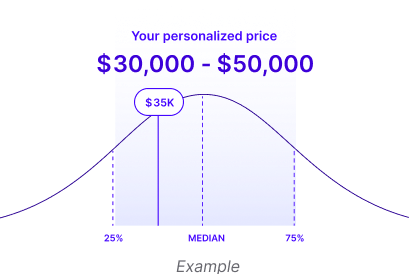Hex Technologies
$3,128–$96,000per year
Fast, fair, easy pricing. No sales call required.
Hex Technologies
|Visit hex.tech
How much does Hex Technologies cost?
Median contract value
$25,680
Based on data from 40 purchases, with buyers saving 41% on average.per year
Median: $25,680
$3,128$96,000
LowHigh
See detailed pricing for your specific purchase
AI Quote Analysis
Upload your quote to check if you’re getting a fair price, under 2 minutes and completely free.

How does Hex Technologies price and package their products?
View pricing on Hex Technologies's website
Product:
Community
FreePayment Terms: MonthlyPopular Features: Unlimited queries, up to 5 projects.
Compare prices for similar companies
| Supplier | Hex Technologies | Datawrapper |
|---|---|---|
| Median Contract Value | $25,680 | $45,000 |
| Avg Savings | 41.13% | - |
Other companies you may be interested in
Negotiating with Hex Technologies
Negotiation Tips
Leverage the offers from competitors by presenting them during your negotiation with Hex Technologies. Make it clear that you are considering alternatives that offer similar functionality at a lower cost and highlight any specific pricing details from other suppliers. This tactic can significantly increase your leverage to negotiate better terms and prices.
If the renewal involves a price uplift, argue that your budget does not account for this increase and that your historical spending should lead to a flat renewal rate or even a decrease. Use specifics about your current usage and previous agreements to strengthen your negotiating position.
Negotiate to have any auto-renewal clauses removed from your agreement. Emphasize that your finance team requires the flexibility to negotiate terms without being locked into an auto-renewal, which affects your leverage in future negotiations.
Propose to act as a reference or participate in a case study in exchange for favorable terms. This can evoke goodwill from Hex Technologies and may lead to discounts or extras that are not originally offered.
If your usage is set to increase significantly, leverage this growth potential to negotiate lower rates per user. Emphasize that your growing team will require economies of scale, and ensure that any contract reflects reduced user costs as you expand.
Considerations when buying Hex Technologies
OwnershipPrivate
Fiscal year endDecember
Best months to buyJanuary, June
Payment TermsMonthly, Annual
Upgrades/downgradesYes, Hex Technologies offers both upgrades and downgrades for its services, making it easy for users to adjust their resources as their needs change.
Redline thresholdRedline threshold estimate is $50k.
Legal
Vendr community insights for Hex Technologies
What real buyers recommend in the negotiation process
Company with 201-1000 employeesThis quarter
Monthly Payments are common, but some have noted savings by moving to annual or quarterly paymentsCompany with 201-1000 employeesThis quarter
Hex will automatically include language allowing them to use logos and marketing collateral, so request it be removed if desired (recommended)Company with 201-1000 employeesThis quarter
Hex Technologies will often include price increase language in their agreements at ~5% upon renewal.Company with 201-1000 employeesThis quarter
Hex Technologies includes auto-renewal language in the agreements, typically with a 30 day opt-out period. This can be removed upon request.Company with 201-1000 employeesThis year
Standard terms have 5% uplift language.Company with 201-1000 employeesThis year
Hex would not allow us to change our auto-renew terms under 7 users. We only wanted to renew 5 so we had to keep those terms the same. Company with 201-1000 employeesThis year
Pricing started at $150/user/month for 15 users with future growth plans of 20 users. We were able to secure pricing of $100/user/month in exchange for this being a new partnership and upcoming future growth within the term. Company with 201-1000 employeesThis year
Negotiated $0 on Hex Onboarding Services - Build Sessions SKUCompany with 201-1000 employeesThis year
Negotiated a 16.7% discount & 33.3% discount on Hex Platform Access - Enterprise Edition Author Seats - 50 seat commitCompany with 201-1000 employeesA while ago
SSO only available by upgrading to Enterprise (no seat minimum for Enterprise, although they will push for this)Company with 201-1000 employeesA while ago
We were able to secure a 50% discount from list price on Enterprise due to growth associated in our renewal.Additional Info
What is Hex Technologies?
Hex is a collaborative data platform that brings everyone together to explore, analyze, and share.Hex Technologies's 5 Product
Hex Technologies: Community
Free to explore data and showcase your work.Hex Technologies: Enterprise
Advanced security, support and control for organizations.Hex Technologies: Enterprise (Unlimited Authors)
Advanced security, support and control for organizations.